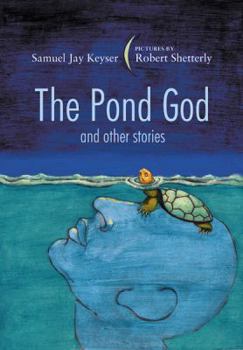The Pond God and Other Stories
Oscar Wilde was once asked why he wrote stories for children (for example, The Happy Giant). His answer: "I no more write for children than I write for adults. Rather, I write for those who find in... This description may be from another edition of this product.
Format:Hardcover
Language:English
ISBN:1886910960
ISBN13:9781886910966
Release Date:September 2003
Publisher:Front Street
Length:43 Pages
Weight:0.60 lbs.
Dimensions:0.5" x 5.8" x 8.3"
Age Range:8 years and up
Grade Range:Grade 3 and higher
Customer Reviews
1 rating
Nature as Perceived by Often Silly Gods
Published by Thriftbooks.com User , 21 years ago
As a young child, I loved to have my mother read the Greek myths to me. I was always fascinated by the exaggerated flaws of the Greek gods and their silly behavior. These stories helped me to understand the people around me. They were my first studies in psychology.In writing these stories, Samuel Jay Keyser tells us that he was inspired by a Navajo shaman who once said that he had seen a god walking across the horizon. "The horizon is not a place but a perspective. What happens there depends on who you are."As I read The Pond God and Other Stories, I was reminded of those Greek myths that I adored as a youngster. The book contains many lessons, especially about natural behavior, that will stimulate the minds of youngsters and those who read to them. My favorite stories were the ones with such lessons. These stories include The Pond God (about finding contentment), How a God Lost Himself and Found Beauty (how Nature's beauty can bring us peace), The Crooked God (about our need for others), How a Bird Went Free (the virtues of self-reliance), How a Thief Stole the Horizon (be careful who you trust), How the Sun Tricked a God (how some people always use and respond to deception), How a God Hid Behind the Wind (on the natural order of things), The God and the Spider (how what you don't know can hurt you), The Flailing God (of Pyrrhic victories), How a God Remained True to His Nature (trust yourself), The Old God and the Very Young God (how "weaknesses" become strengths when two complement one another), How the Gods Changed (how reality differs from our subjective perceptions), How a God Helped a Pigeon (ask for help when you need it and can get it), The God Who Walked in Straight Lines (on the need to take control of your own destiny), May Misfortune Smile on You (how bad news can be good news), The Hideous God (look past appearances to the inner reality), How a God Brought Water to Stones (how cooperation can create improvements), How the Moon Came to Be (how sharing the load makes less work for everyone), How Clouds Came to Be (how envy can destroy happiness) and Why a God Sat Motionless on the Horizon (how words can hurt, even when wise). In most cases the lessons are spelled out at the end of the fable.The fables are quite brief and encompass one page. For nighttime reading, this book will require relating more than one story. Adults who are reading this book to children should explain that these "gods" are not real, but are imaginary learning companions who are there to help us understand how to live our lives better. You will probably want to be sure that your child understands your religious beliefs and how those differ from the stories here since many fables talk about how people make up the existence of "gods" from what they see around them. Many of the fables talk about how natural phenomena got started (like the locust cycle), and you don't want to confuse them about science. So you should also use the stories as an opportun





